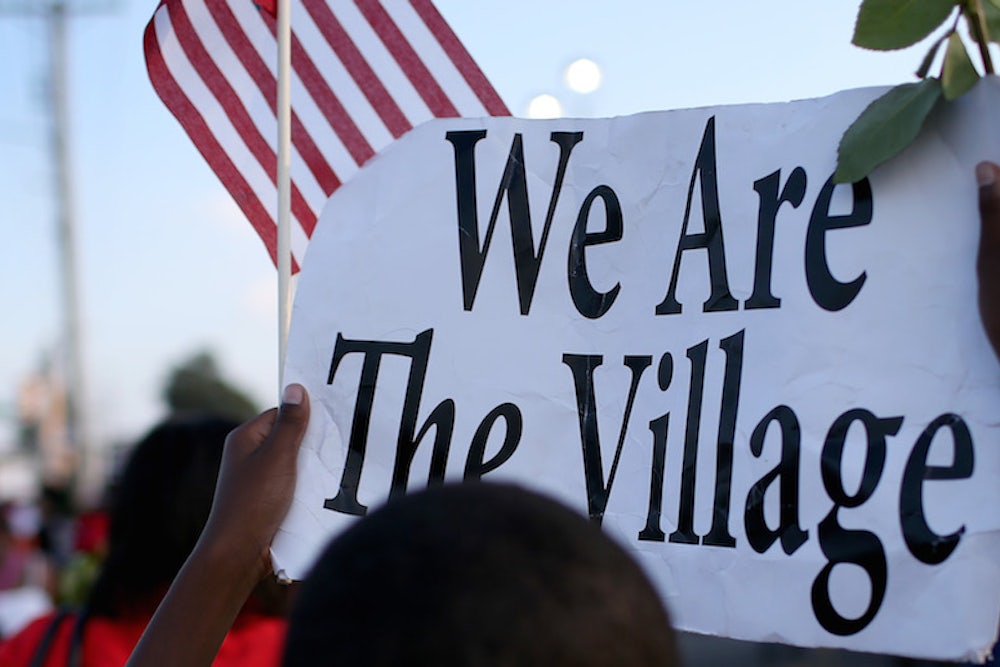During a brief moment of calm late last week—when the police stood down and protesters celebrated a short-lived victory and it seemed as if the story had undergone a permanent transition—I wrote an article drawing a single line between the trampling of liberties in Ferguson, Missouri, and broader, less violent social phenomena, like voter suppression.
Since then, the police have taken another volte-face, public opinion about the events in Ferguson has polarized along racial lines, and the combination of the two has elicited a conservative response that neatly underlines my point.
I’m not talking about responses to the details of Michael Brown’s shooting, or the emergence of looters and outside agitators. I’m talking about the reflexive hostility with which conservatives reacted to the news that protesters in Ferguson had organized a voter registration drive.
“If that’s not fanning the political flames, I don’t know what is,” Missouri GOP Executive Director Matt Wills told the conservative website Breitbart. “I think it’s not only disgusting but completely inappropriate.”
Breitbart described the drive as “efforts by liberal organizers to set up voter registration booths”—a rendering that reflects a few revealing assumptions. But let’s begin with the overarching one—that these organizers are engaged in something nefarious; that their real goal here is to advance ideological or partisan interests, unrelated to those implicated by the civic unrest.
The Democrats' real agenda here: https://t.co/dLCyHwLpni https://t.co/3YaWSzJL0g
— Dan McLaughlin (@baseballcrank) August 18, 2014If you believe that, you have a blinkered view of the political dynamic on the ground—a sense that what’s going on is an unexpected departure from a placid, pre-Michael Brown status quo, which will return after this aberration runs its course, if liberals just quit meddling. Either that or you're a carpetbagger.
In reality, the city of Ferguson is overwhelmingly black, while its police and politicians are overwhelmingly white. The friction between the black community and the white leadership predates Michael Brown’s shooting. But even if it didn’t, it’s hard to look back at what’s happened over the past week and a half and conclude that the majority of the city has been well served by its elected officials and public servants. Residents can’t change that dynamic without at least making the latter fear for their jobs, though, and a predicate to that is a high level of participation in the democratic process. Until now, black residents of Ferguson weren’t deeply engaged in that process. Thus: voter registration.
So the argument against voter registration in Ferguson fails the most immediate, relevant, local test. But notice that in the previous three paragraphs I didn’t write any of the following words: Democrats, Republicans, liberals, conservatives, Barack, Obama, Hillary, Clinton, McCaskill, Blunt, Nixon, Obamacare, taxes, welfare. It’s very hard to draw a line connecting voter registration in Ferguson to unrelated statewide and national campaigns and policy debates. Ferguson is a small city in a conservative state. The idea that the Missouri GOP has a great deal to lose if Ferguson residents become more engaged is a big stretch.
Which is to say that even cynical, deracialized arguments against the registration drive don't withstand scrutiny. It only poses a risk to the Missouri GOP, and perhaps the national party, if it snowballs. Preventing that is the only way to make sense of the conservative pearl clutching without reference to race.
But whether you believe the registration drive is a direct response to events in Ferguson or rank liberal opportunism, the idea that registering black voters there is illegitimate or “disgusting,” particularly under these circumstances, does reveal a preference for the existing power imbalance—either on the merits, or because it's a price worth imposing on others to stifle minority participation in the political process. And on that abstract level it's an idea that shares a lot in common with actions that have intensified civil unrest in Ferguson for nearly a week.
